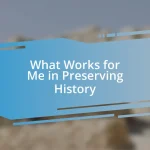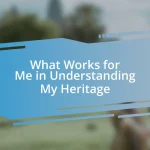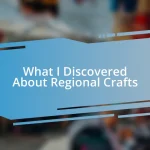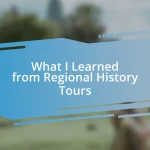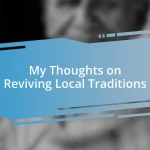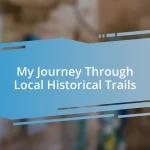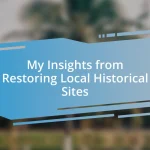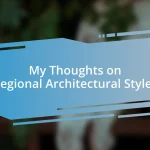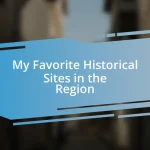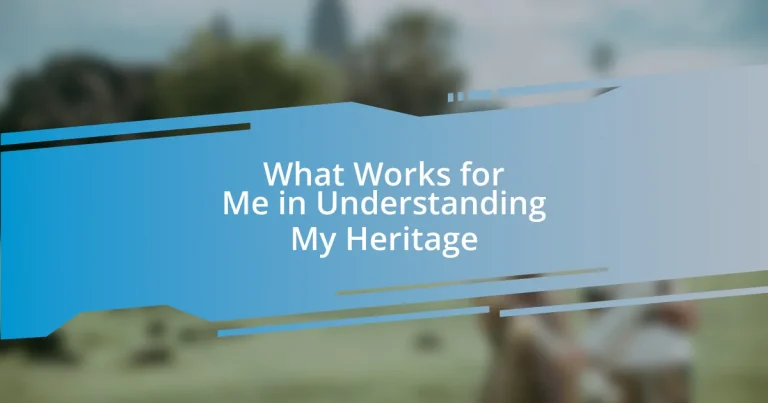Key takeaways:
- Personal heritage connects individuals to their past, shaping identity and values through family stories and traditions.
- Utilizing technology and community events enhances the exploration of heritage, fostering connections and deepening understanding of collective history.
- Sharing heritage stories with others promotes empathy and strengthens relationships, creating a sense of belonging and community across different cultures.
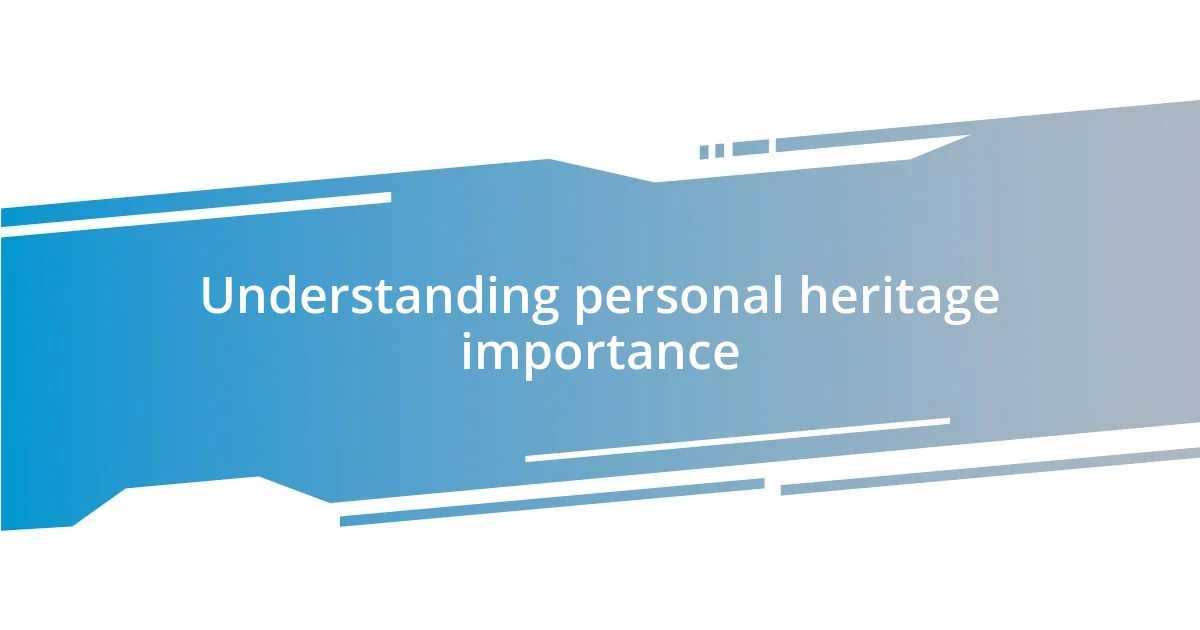
Understanding personal heritage importance
Understanding personal heritage is essential because it connects us to our past and shapes who we are today. I remember sitting at my grandmother’s kitchen table, listening to her stories about our family’s history. Those anecdotes made me feel rooted and gave me a sense of belonging that I’m grateful for to this day.
When I consider my heritage, I realize it’s like a map of my identity, guiding my values and beliefs. Have you ever wondered how your ancestors’ journey informs your choices? For instance, learning about my great-grandfather’s struggle to immigrate instilled in me a deep appreciation for resilience and hard work, virtues I carry in my own life.
Moreover, exploring personal heritage fosters a sense of pride and responsibility to carry forward traditions. It’s incredibly powerful to celebrate cultural practices from my family. I’ve often hosted gatherings, weaving family recipes into my menus, and each dish serves as a delicious reminder of my lineage and the significance it holds in my life.
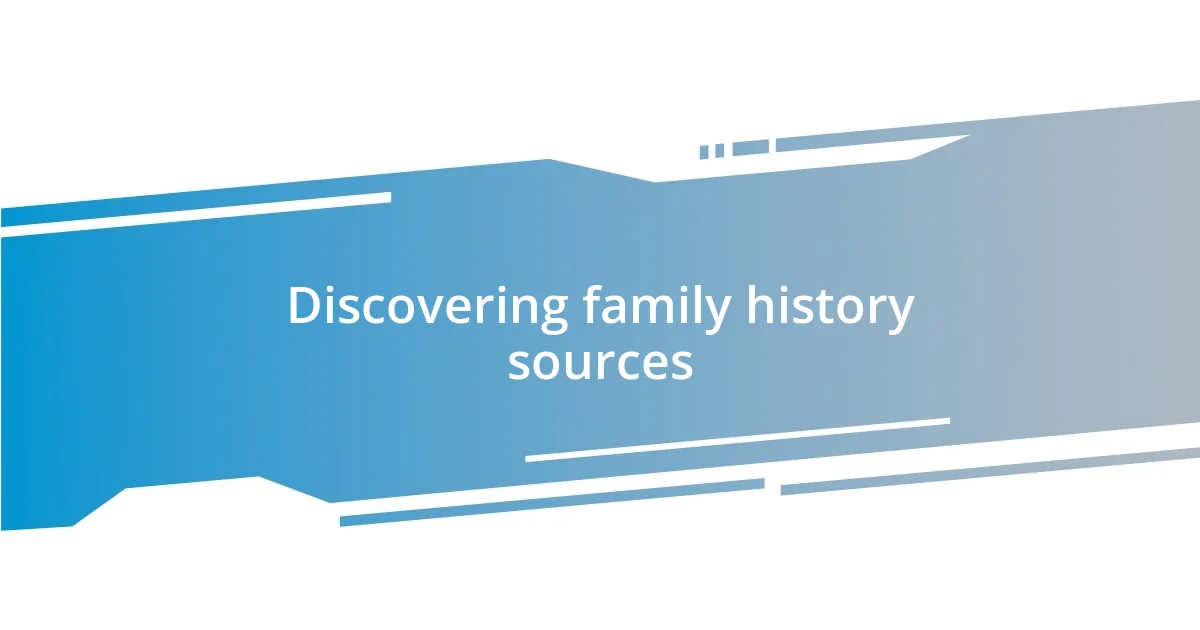
Discovering family history sources
Exploring family history sources can be an exciting venture filled with surprises. I recall the day I stumbled upon my grandfather’s old letters tucked away in a dusty box. Reading his words felt like a window into his life and times, revealing stories and experiences I had never known. Those letters became a treasure trove that expanded my understanding of where I came from and connected me to my roots in a very real way.
Another valuable source is oral histories from family members. I’ve spent countless evenings chatting with my relatives, gathering stories that have shaped our family’s narrative. These conversations not only provided context to names and dates but also carried the emotions and significance behind them. How often do we overlook the wisdom of our elders? Their recollections often bridge the gap between generations, creating a deeper sense of connection with our heritage.
Researching online databases and genealogy websites can significantly enhance the journey. I found a website dedicated to ancestry records, where I could trace my family tree back several generations, which was like piecing together a puzzle. This information has helped me ask better questions of my family and encouraged discussions that have enriched our understanding of our shared history.
| Source | Description |
|---|---|
| Family Letters | Tangible insights into personal experiences and emotions from ancestors. |
| Oral Histories | Personal accounts from family members that provide context and emotion. |
| Online Databases | Structured data that reveals lineage and connects family trees. |
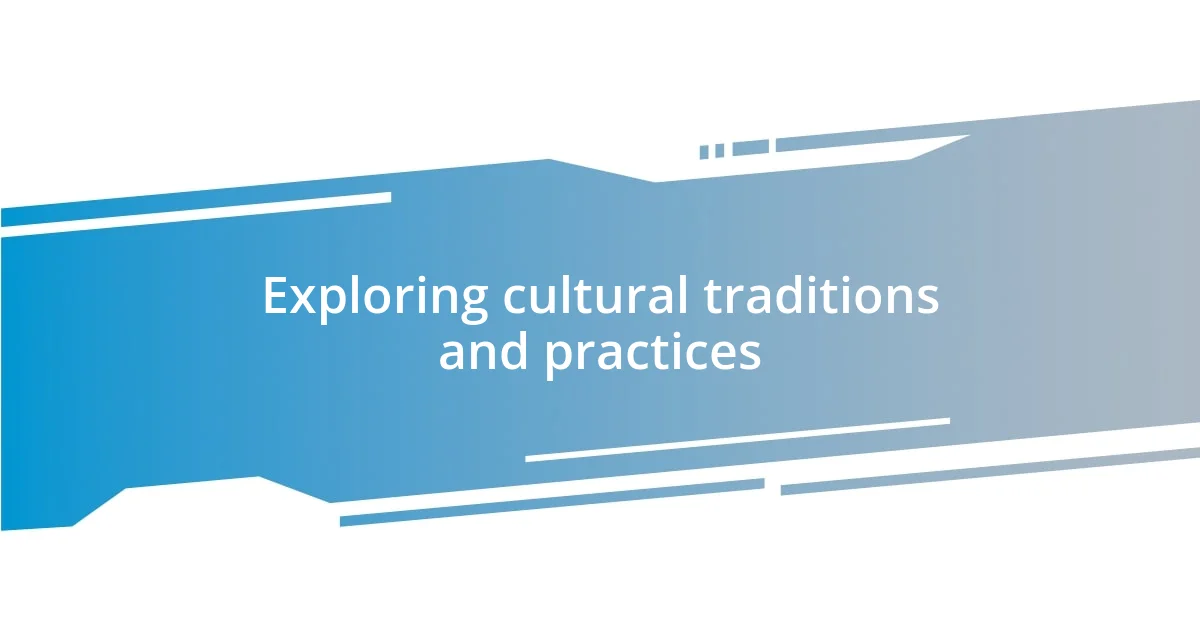
Exploring cultural traditions and practices
Exploring cultural traditions and practices has been enlightening for me and has deepened my connection to my heritage. One of my fondest memories is attending a traditional festival with my family, where the air was filled with laughter, music, and the aroma of familiar spices. Participating in those festivities made me appreciate the richness of our culture and transformed what could have been just a casual event into a celebration of our identity.
Engaging with specific traditions has added layers to my understanding of who I am. Each practice tells a story, binding generations together. Here are some traditions that have resonated with me:
- Family Gatherings: Whether it’s a holiday or a simple Sunday meal, these moments are steeped in love and shared history.
- Storytelling Nights: I often sit down with my younger family members, sharing tales of our heritage, ensuring that our stories live on.
- Cultural Crafts: I love practicing traditional crafts, such as weaving, which connects me to the skills of my ancestors and nurtures my creativity.
- Festive Recipes: Cooking family recipes has become my way of keeping traditions alive; each dish serves as a delicious connection to my roots.
These practices not only nourish my spirit but also create ties to my family, giving me purpose in preserving our legacy. They remind me that our cultural traditions are not just rituals; they are the heartbeat of our heritage.
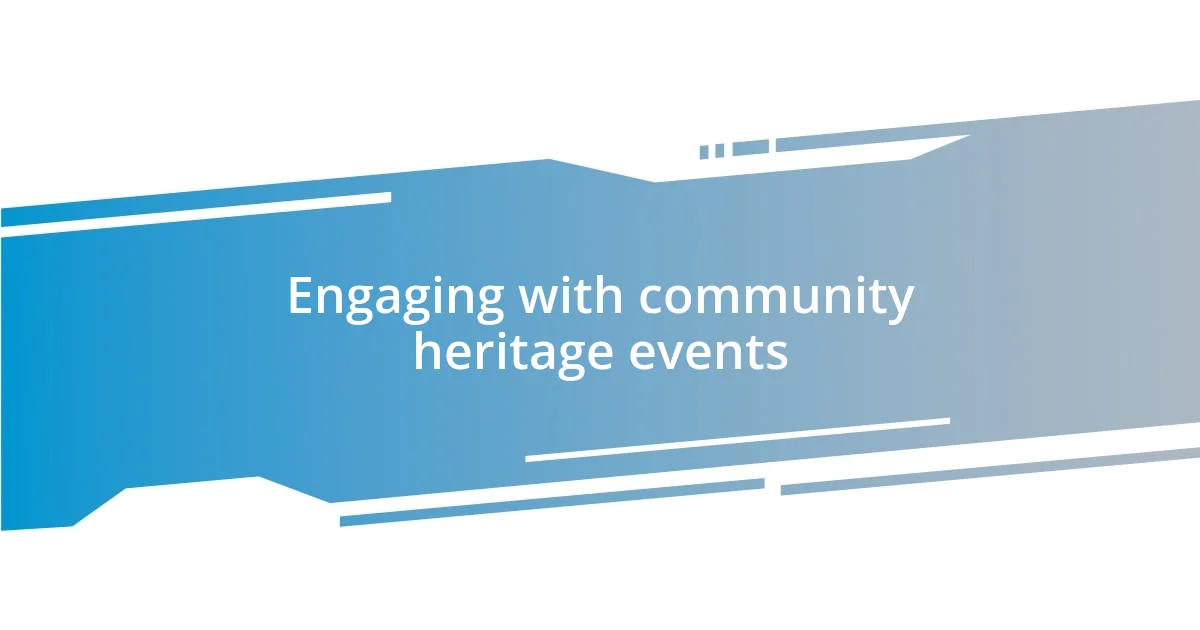
Engaging with community heritage events
Participating in community heritage events has transformed the way I perceive my roots. I still recall the excitement I felt when I joined a local multicultural festival for the first time. It was a vibrant display of music, dance, and art, all woven together by the stories of the individuals who make up our community. Seeing people from different backgrounds come together to celebrate their heritage made me realize just how interconnected we all are. Have you ever attended an event that left you feeling deeply connected to your community?
Moreover, volunteering at these events has offered me a unique perspective on heritage. I remember helping to organize a traditional dance workshop where I was able to learn not just the steps but also the history behind the dance. The energy from participants—sharing their passion and knowledge—was palpable. Each twirl and swirl conveyed a story from generations past, enriching my understanding of the culture involved. It makes me wonder, how much can we discover when we actively participate rather than just spectate?
These experiences have sparked meaningful conversations with peers and family members about our shared history. Attending discussions and panels at community events often reveals fascinating insights that I might not have encountered otherwise. I think back to a panel on local folklore where, afterwards, I felt compelled to reach out to my parents about the stories that shaped their childhoods. Engaging with these aspects of our community heritage feels less like an obligation and more like a journey—one where every interaction becomes a stepping stone to a deeper appreciation of who we are and where we come from.
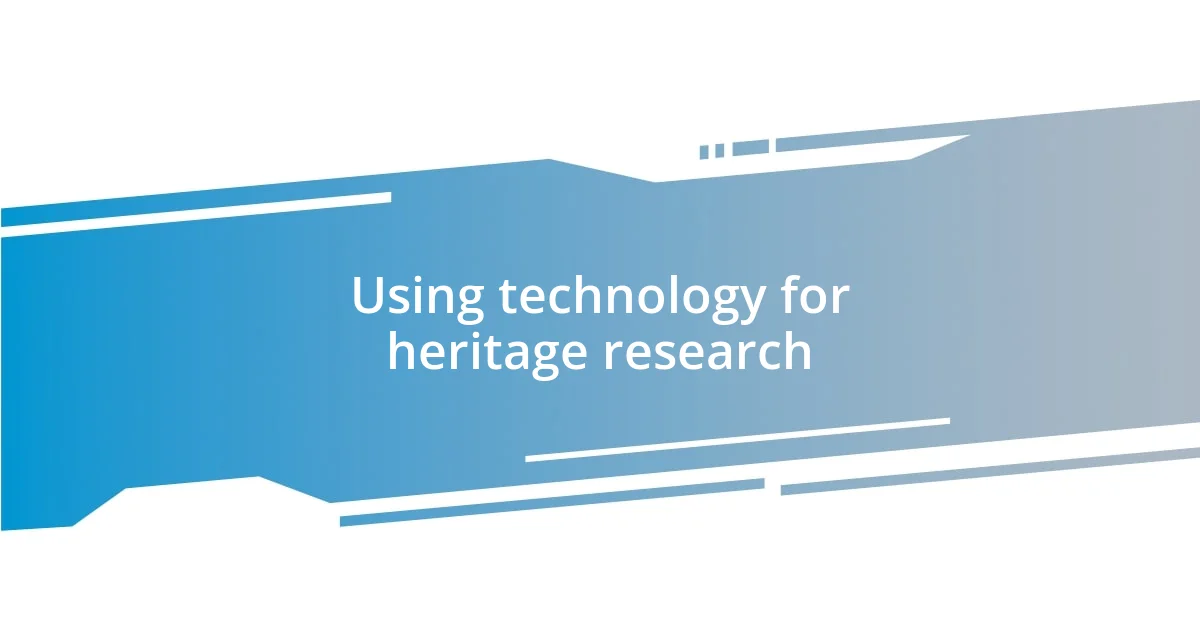
Using technology for heritage research
Using technology for heritage research has opened up a world of possibilities that I never imagined. I remember the thrill of discovering online databases filled with records, photos, and stories that showcased my ancestors’ journeys. Websites like Ancestry.com and FamilySearch can provide astonishing leads, allowing me to trace my lineage, and sometimes, I feel as if I’m putting together a puzzle that reveals not just names but the essence of who I am.
One of my favorite tools is social media. I have joined groups dedicated to specific ethnic communities and heritage discussions, where members share everything from recipes to folktales. Just the other day, I participated in a live chat about traditional crafts, and it felt incredible to connect with people who share my background. Their insights and experiences sparked questions in me, making me want to explore these traditions further. Isn’t it fascinating how a simple hashtag can tie us to our roots across miles?
Additionally, I’ve found that using genealogy apps on my phone has completely transformed my research process. I can access information anytime and anywhere, which is fantastic. The other week, while sitting in a coffee shop, I had a lightbulb moment as I discovered a long-lost relative after entering a few key details. That instant connection felt magical. Technology has not just facilitated my research; it has deepened the emotional connection I have with my heritage, transforming the act of searching into a journey of rediscovery.
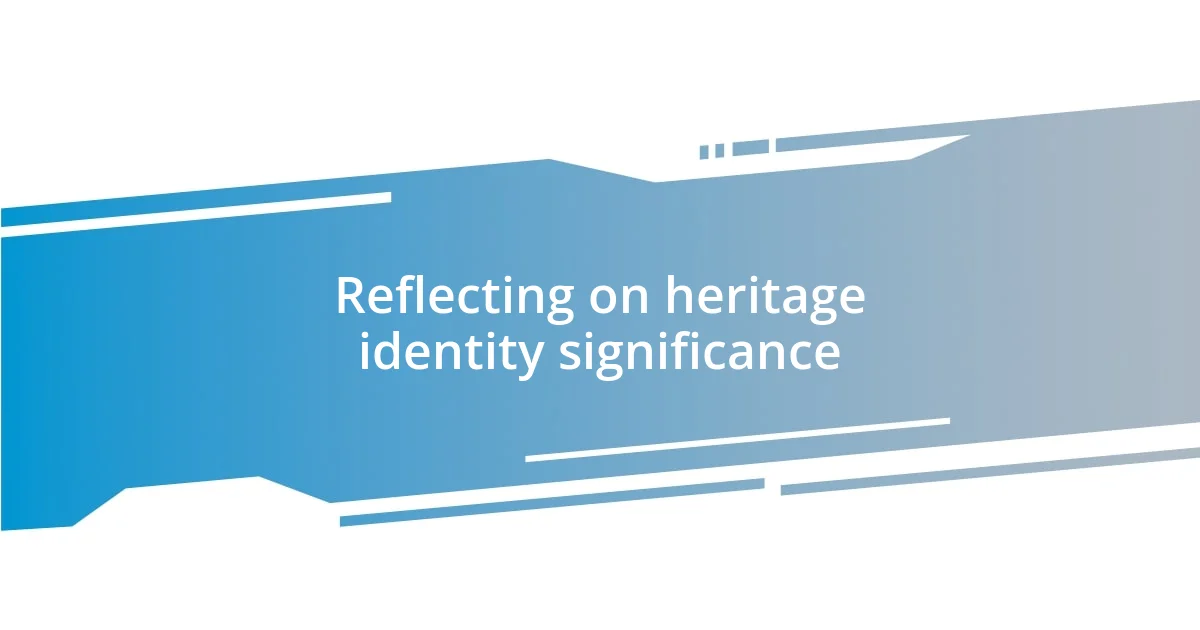
Reflecting on heritage identity significance
Reflecting on my heritage identity significance often leads me to moments of unexpected clarity. I think back to one summer evening when my grandmother shared stories of her upbringing in a small village. As she spoke, I felt an overwhelming connection to a world I had never known but could vividly picture through her words. It made me realize how our identities are often stitched together by the narratives passed down through generations, don’t you think?
In one of those reflective conversations, I asked my mom why certain traditions mattered so much to her. She explained that they were a way to honor those who came before us, a bridge connecting past to present. I was struck by the idea that embracing our heritage is not just about personal pride but also about continuity—ensuring that the essence of our forebears lives on through us. It’s fascinating how the simple act of sharing and discussing these roots can deepen our ties to them.
Sometimes, I find myself questioning aspects of my identity. What does it mean to hold onto my heritage in a world that constantly evolves? I’ve come to appreciate that my heritage is a source of strength and resilience, serving as both a foundation and a compass for my values and actions. Reflecting on these insights often helps me navigate challenges, reinforcing the idea that I am part of something much larger than myself. How powerful is it to think that our identities can serve as anchors in turbulent times?
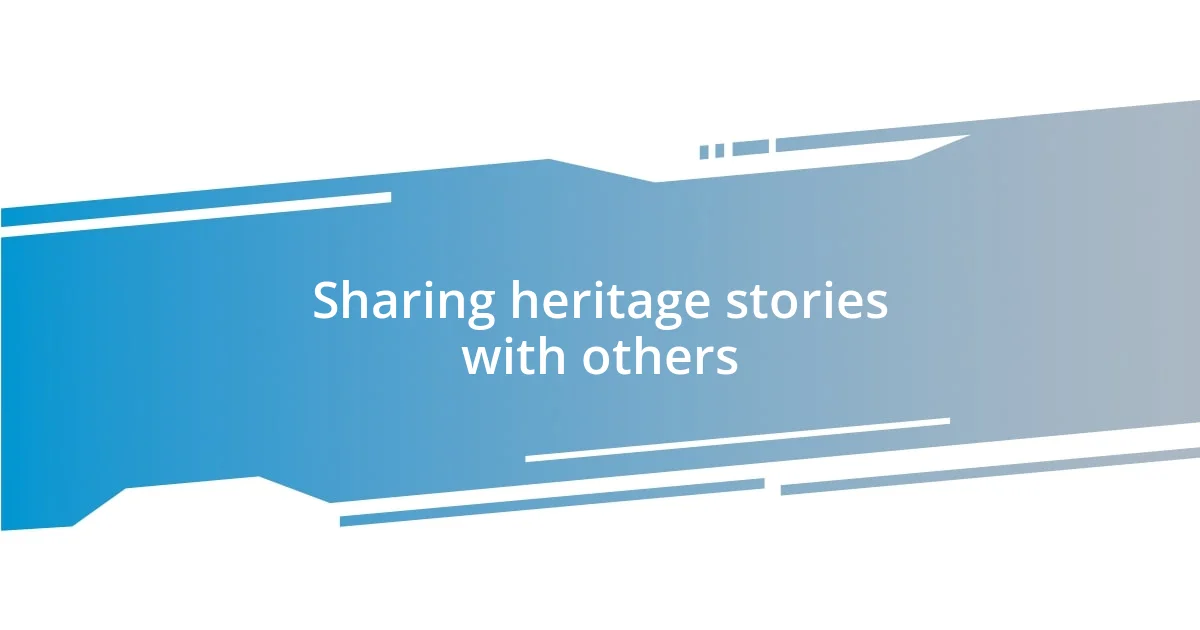
Sharing heritage stories with others
When I share my heritage stories with others, it feels like unveiling a treasure chest of memories and experiences. Just recently, I invited friends over for a dinner featuring family recipes passed down through generations. As I served each dish, I shared the stories tied to them—the laughter and tears that accompanied those meals. It struck me how food has a way of connecting our past with the present, inviting everyone to be part of something bigger than just a meal.
One evening, I joined a storytelling circle at a local cultural festival. Each participant shared tales from their heritage, and I felt a wave of camaraderie wash over us. Listening to others recount their traditions made me reflect on my own upbringing, evoking emotions that lingered long after the event. Isn’t it remarkable how, in sharing our heritage, we not only preserve memories but also foster empathy and understanding among diverse cultures?
Engaging with others about heritage stories opens doors to new friendships and deepens connections. I remember a conversation with a colleague who revealed her family’s migration story, which echoed my own experiences. We spent hours exchanging anecdotes, finding common ground in our shared struggles and triumphs. Such exchanges remind me that our stories are timeless bridges, allowing us to relate to one another beyond differences. How can we not cherish the connections forged by simply sharing where we come from?
